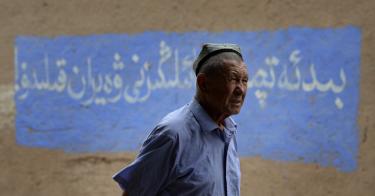Disturbing revelations of China’s extensive system of surveillance have come to light over the last several weeks. A Human Rights Watch report detailed a mass surveillance app being used by Chinese police in Xinjiang to monitor the movements and activities of the territory’s Uighur Muslims, including the hundreds of thousands—if not millions—of those being held in political “re-education” facilities.
Uighurs are arbitrarily detained at a breathtaking rate, in part because of the application’s broad reach. The app aggregates data from numerous systems and sources, including CCTV, local snitching reports, and police checkpoints that are as ubiquitous as convenience stores. In effect, it allows the police to monitor the Chinese people’s every move.
As the data passes through the app, it screens and analyzes for so-called suspicious activity. According to the Human Rights Watch, “suspicious activity” encompasses actions as benign as leaving one’s house via the back door rather than the front–or any behavior that breaks from daily activities.
The international community has been quick to condemn China for its arbitrary mass detention of Uighurs. But it has devoted relatively scant attention to other population’s that might be affected by China’s increasing use of emerging technology as a tool of repression.
China’s embrace of oppressive surveillance technology will doubtless affect more than just its Muslim population. One especially vulnerable group is North Korean refugees.
While the total number of North Korean defectors currently in China are unknown, some estimate that between 100,000 to 300,000 currently remain in hiding. Most ultimately seek refuge in South Korea, where they are granted automatic citizenship. However, nearly all refugees from the North must pass through China in order to reach freedom in South Korea. These refugees rely on underground networks—primarily made up of Christian missionaries and smugglers—to guide them along their treacherous journeys.
Escape from the brutal Kim regime depends on anonymity, invisibility, and use of the underground system. Invisibility is essential due to Beijing’s agreement with Pyongyang to repatriate all North Koreans found in China.
The UN officially classifies North Koreans as refugees sur place. So Beijing’s repatriation of North Korean refugees technically violates China’s commitments to the UN Refugee Convention. Yet for years, China has consistently repatriated North Koreans, deeming them economic migrants, not refugees.
At this very moment, seven North Korean escapees are facing repatriation by China — one of them, a 10-year-old girl whose mother and father already made their way to freedom in South Korea. South Korea and the U.S. voiced their concerns on behalf of all seven, calling upon China to issue their release immediately.
If these pleas go unheard, however, the refugees will face severe consequences after being returned to the clutches of Pyongyang. A 2014 report from the United Nations Commission of Inquiry documented systematic repression of North Koreans returned from China. Most are thrown in ordinary prison camps (교화소) or political prison camps (관리소) where they will most likely be subject to torture, malnourishment, and forced labor. Many pregnant North Korean women are forced to abort their children, often without anesthesia, sometimes by having a soldier stand on their pregnant stomach. Should the child survive the abortion, the mother may be forced to watch her baby be smothered to death. Conditions are brutal for all returned refugees, but they are especially grave for women.
The majority of North Korean refugees receive support from Christian missionaries. North Koreans who accept help from missionaries or who convert to Christianity while in China face particularly harsh treatment upon repatriation. The Commission of Inquiry noted that refugees are usually asked whether they had contact with Christian missionaries; those who did face harsher consequences. The Commission report found that Christians are uniquely persecuted among religious groups in North Korea. Another group, Open Doors USA, has identified Pyongyang as the world’s worst persecutor of Christians.
The U.S. is already concerned about the far-reaching consequences of China’s increasingly vast surveillance efforts. Beyond the threat posed to individual Chinese citizen’s privacy, it’s worth giving serious thought to the secondary effects of these policies, including the effect they may have on North Korean refugees.
This piece originally appeared in Forbes https://www.forbes.com/sites/oliviaenos/2019/05/22/the-threat-posed-by-chinas-surveillance-technology-to-north-korean-refugees/#d2f8ab117faa



